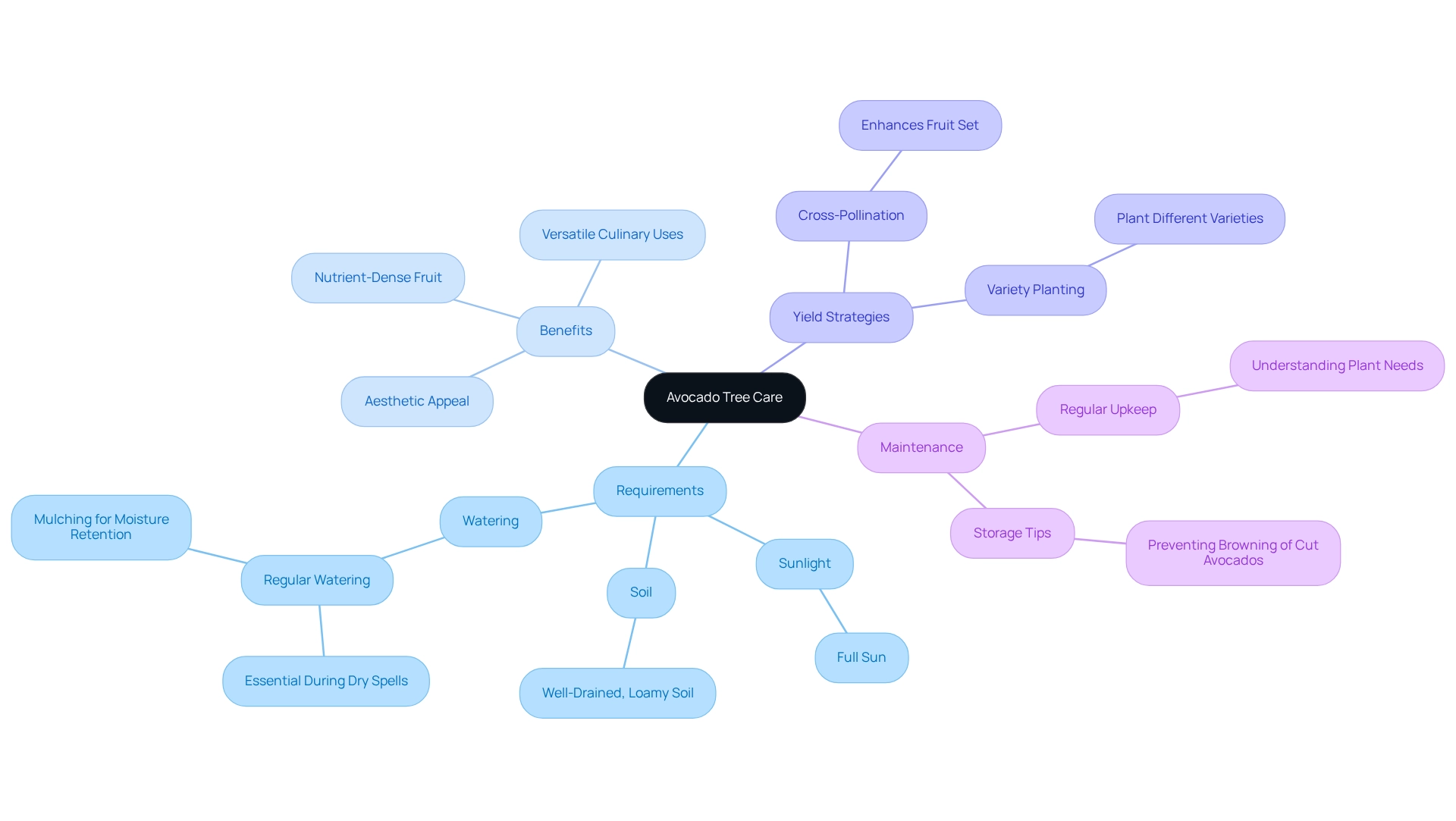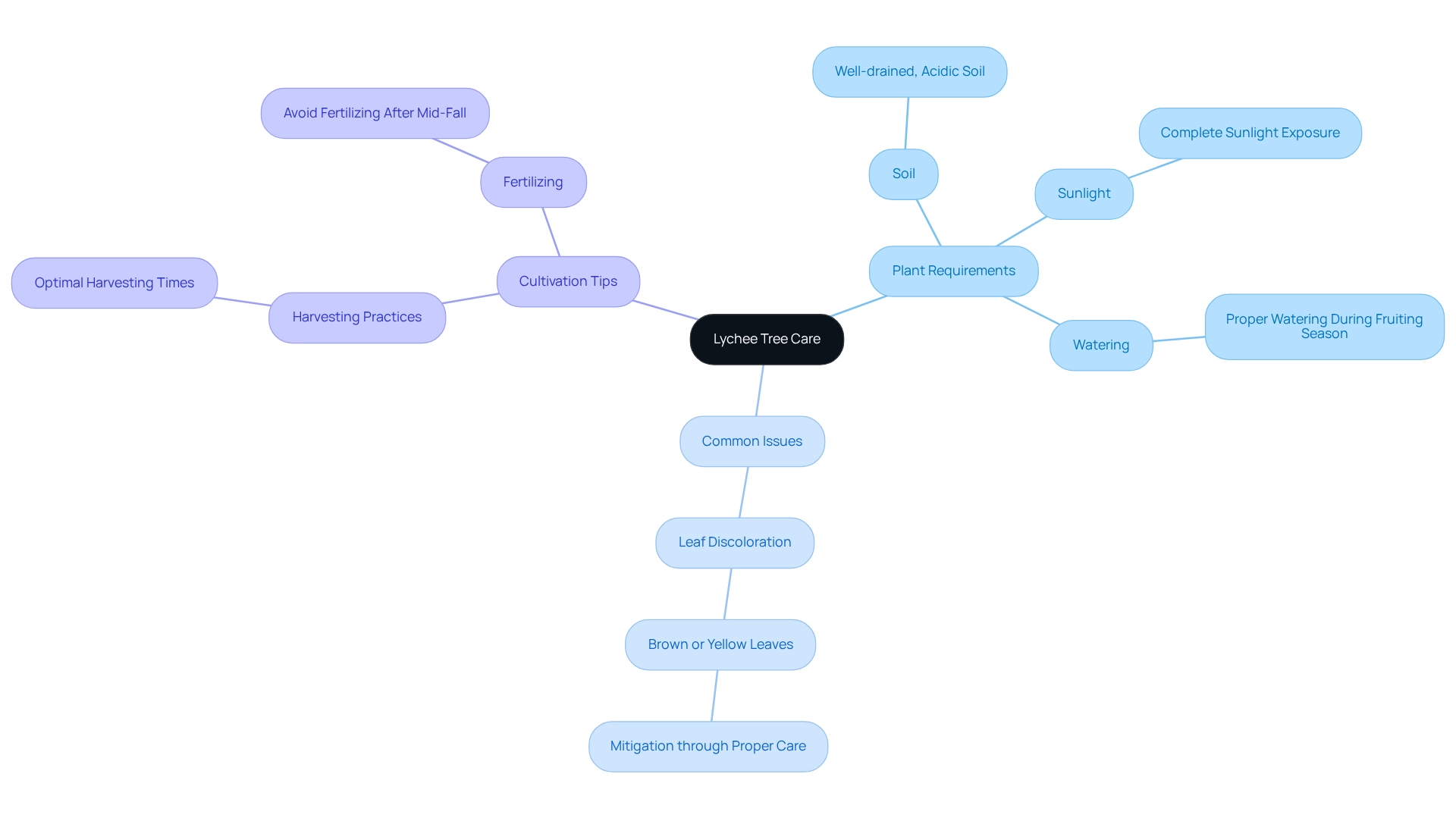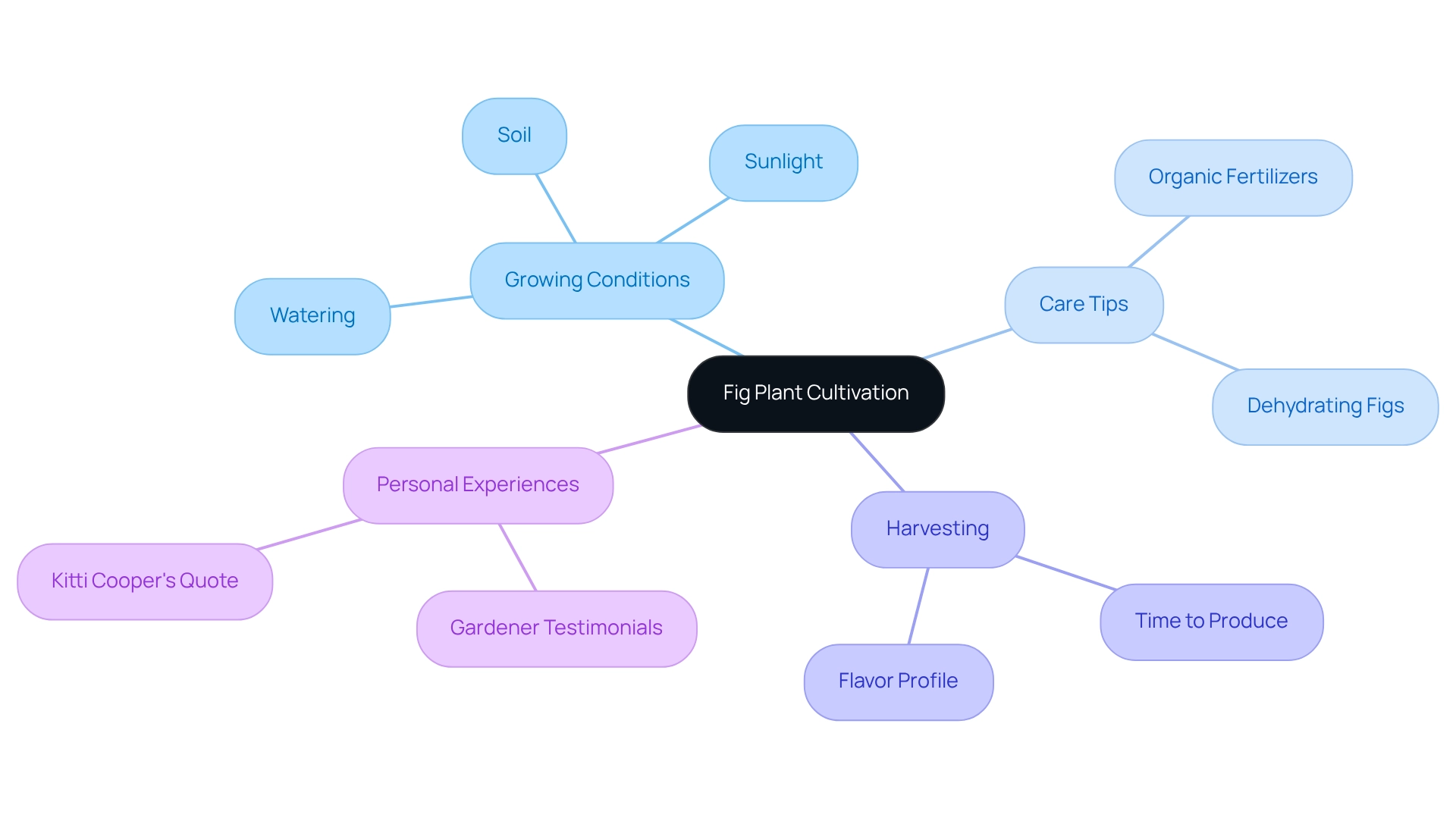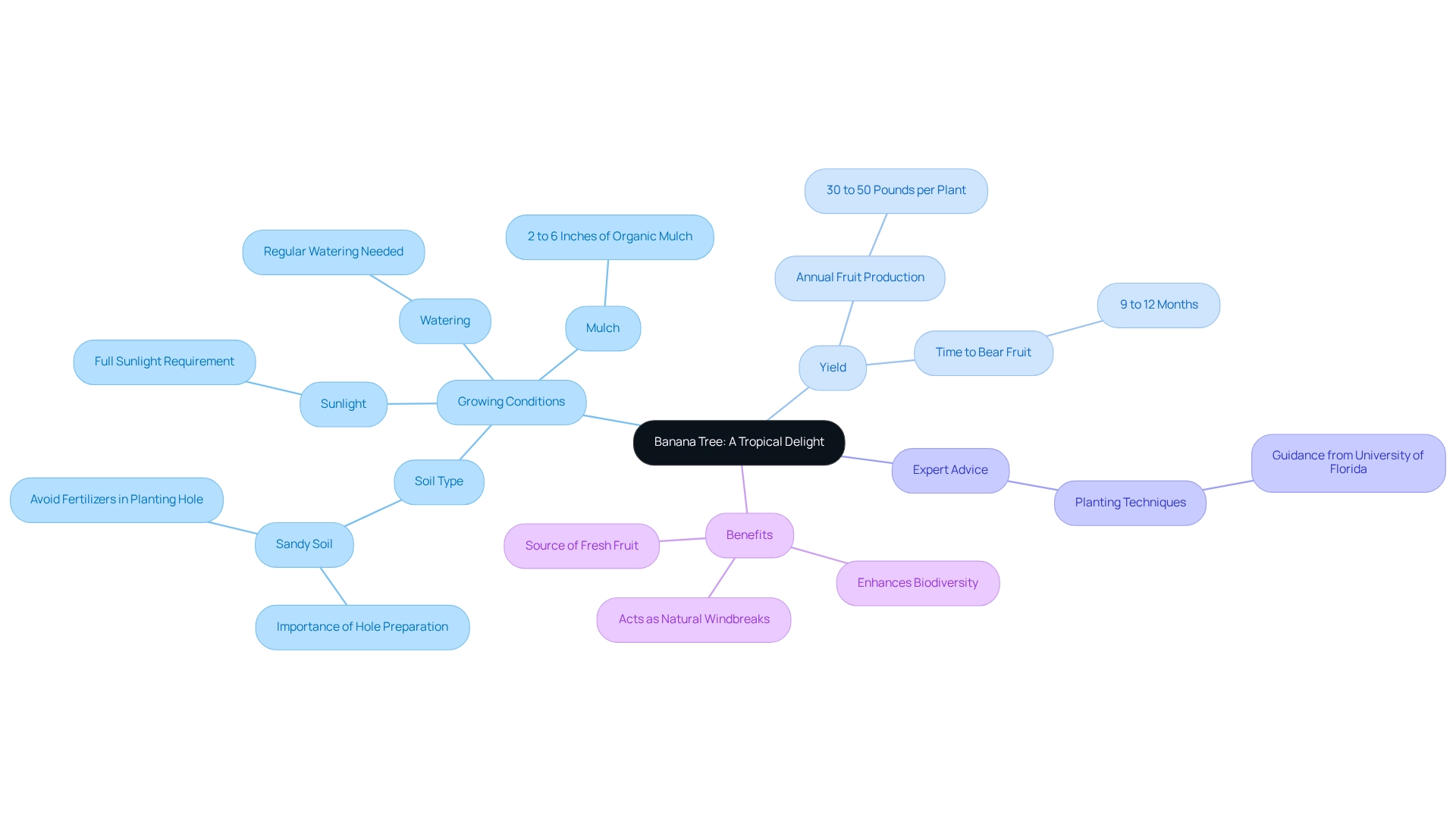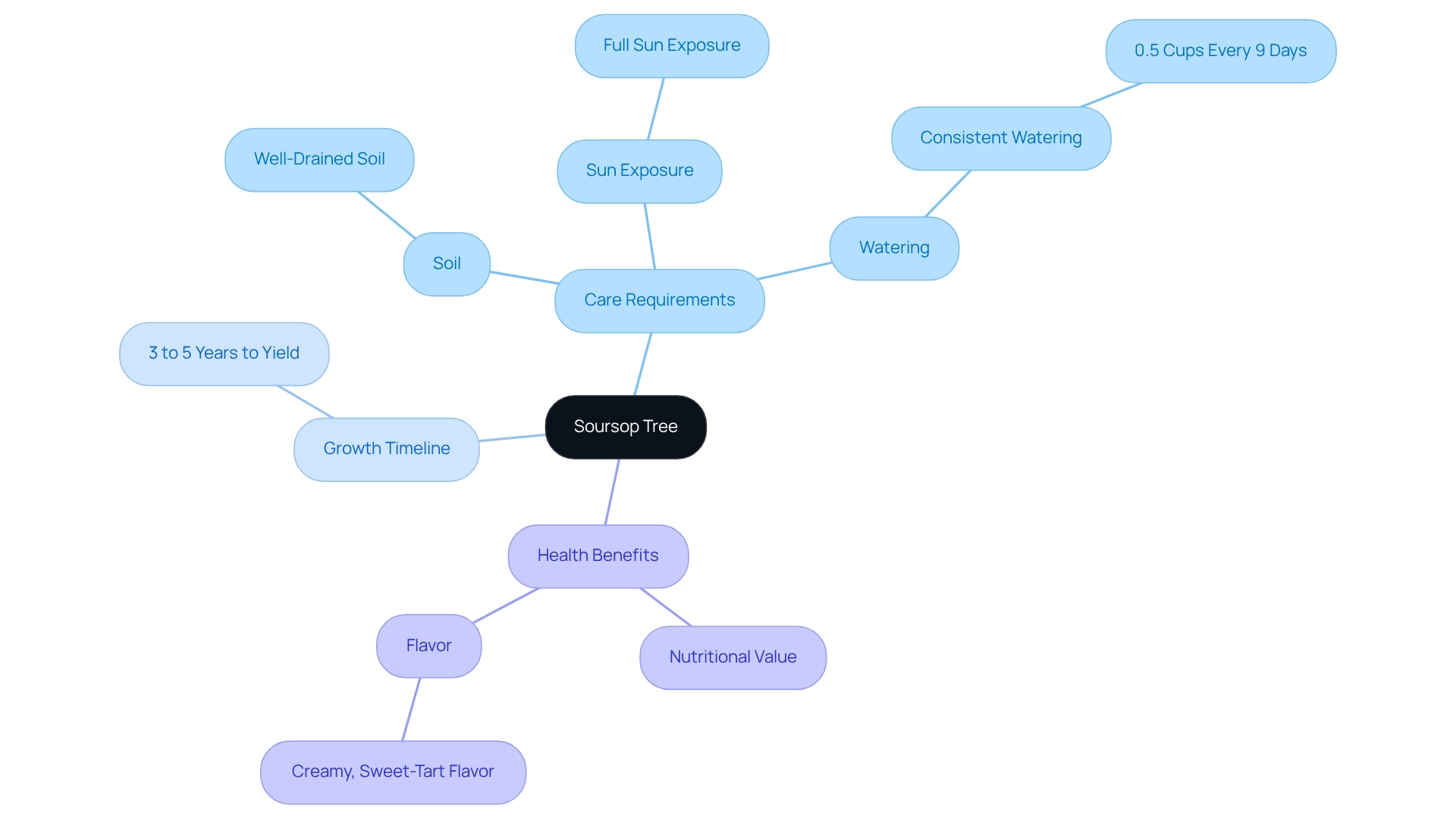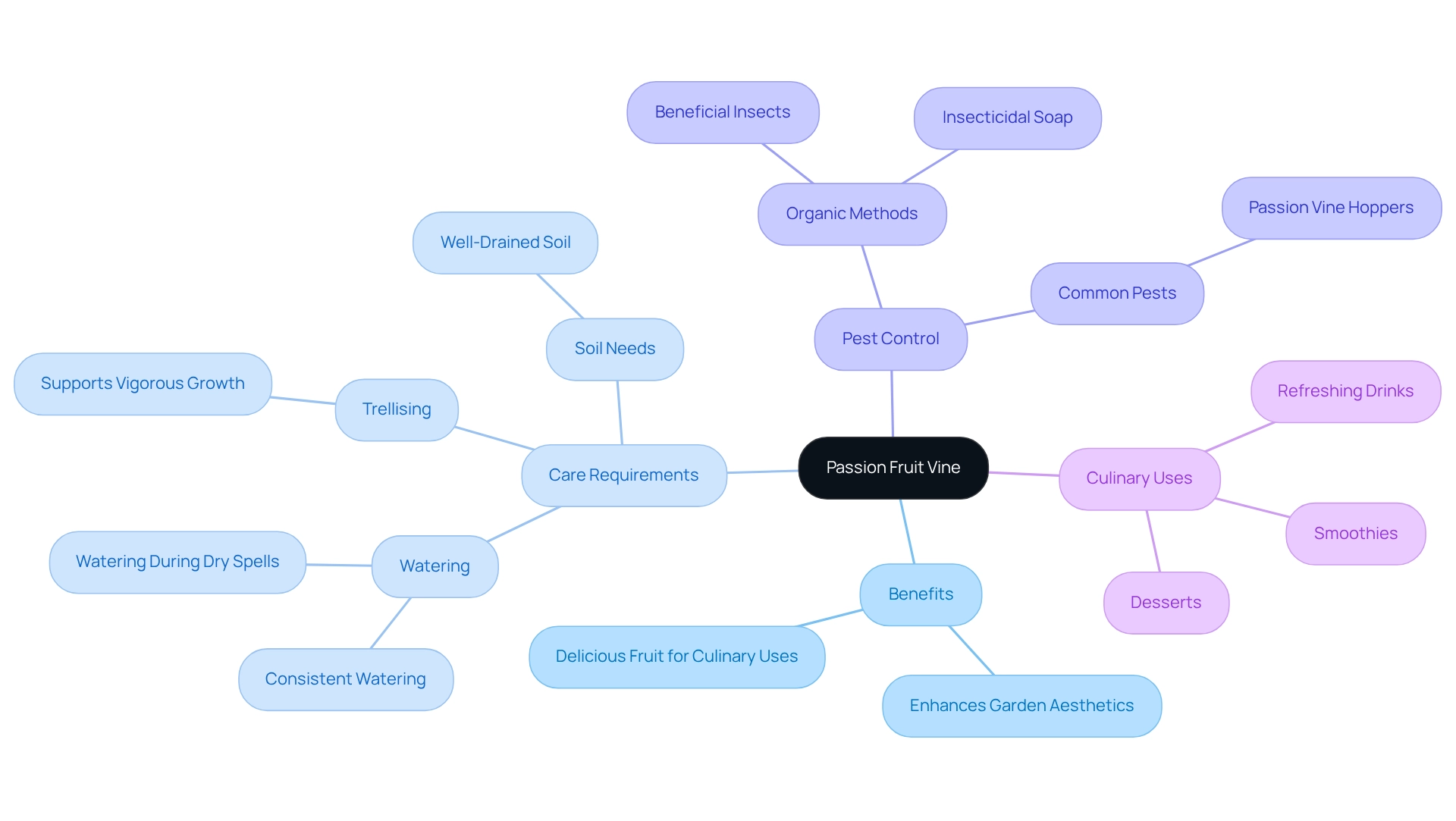This article lovingly highlights essential fruit plants that are perfect for backyard gardens, showcasing their compatibility with the state's unique climate and the wonderful benefits they bring to home gardeners.
Each plant comes with its own care requirements and growth timelines, inviting you to experience the joy of harvesting your very own homegrown produce.
Imagine the satisfaction of picking fresh fruit from your garden! These plants not only enhance your gardening journey but also nurture a deeper connection to nature. As you cultivate these fruits, you'll discover that they can transform your outdoor space into a thriving oasis, enriching both your life and your family’s.
So, why wait? Embrace the beauty of gardening and consider adding these fruit plants to your backyard. With a little love and care, they can flourish and provide you with delicious rewards. Let's grow together and make your gardening dreams a reality!
Everglades Farm: Premium Tropical Fruit Trees for Florida Gardens
Everglades Farm stands out as a nurturing online nursery located in Homestead, specializing in a delightful variety of tropical fruit plants. With a heartfelt commitment to sustainability and customer satisfaction, the farm offers a wide selection of healthy, high-quality plants that flourish in Florida's warm climate. You can choose from
fast-growing and dwarf varieties, making it easier to cultivate your own fruit-bearing garden, even in cozy spaces.
Each plant is lovingly packaged to ensure it arrives in optimal condition, featuring moisture barriers that maintain soil integrity during shipping. Additionally, Everglades Farm provides professional-grade fertilizers specifically formulated for produce, helping to boost growth and yield. This dedication to quality shines through in the impressive customer feedback, with 79% of reviews rating their service as five stars, highlighting the farm's commitment to delivering an exceptional gardening experience.
The focus on your satisfaction is further illustrated by the company's robust support system, which addresses common gardening challenges, such as sourcing healthy plants and providing care after your purchase. By emphasizing quality and your experience, Everglades Farm has positioned itself as a trustworthy supplier for tropical plants, making it a favored choice for home gardeners looking to enhance their outdoor spaces with vibrant, productive vegetation. So, why not take the first step towards your gardening dreams today?
Mango Tree: A Must-Have for Backyard Gardens
The mango plant (Mangifera indica) is a beloved addition to Florida gardens, which are known for their diverse fruit plants in Florida, cherished for its juicy fruit and lush, vibrant leaves. Thriving in full sun and well-drained soil, fruit plants in Florida flourish in the state's warm climate, making them a perfect choice for your garden. However, given their potential size, providing ample space is essential for optimal growth. To nurture these beautiful plants, consistent irrigation and
high-quality fertilizers throughout the growing season are vital for promoting robust health and boosting crop yield.
Imagine the joy of harvesting your own mangoes! With diligent care, fruit plants in Florida, including mango plants, can start producing fruit within just 2-3 years, offering a rewarding experience for home gardeners. In fact, a well-cared-for mango plant, among the fruit plants in Florida, can yield up to 200 fruits per season, significantly enhancing your backyard's productivity in the Sunshine State.
Horticulturists emphasize that the delight of gathering mangoes not only enriches the gardening experience but also fosters a sustainable lifestyle. Each plant invites us to celebrate and appreciate nature's generosity. As a seasoned editor at AI GIFT beautifully puts it, "A mango tells the story of zen wrapped in golden wisdom."
To make your gardening journey even easier, Everglades Farm offers complimentary shipping on purchases over $54.95 for Florida residents, ensuring that you have easy access to these stunning plants. So why wait? Embrace the joy of gardening and let the mango plant bring a touch of sweetness to your life!
Avocado Tree: Essential for a Productive Garden
The avocado plant (Persea americana) is a delightful addition to our gardens, recognized among the best fruit plants in Florida for its creamy, nutrient-dense fruit. Thriving in well-drained, loamy soil, avocado plants need full sun to truly flourish. Florida's subtropical climate is perfect for growing popular fruit plants in Florida, including varieties like 'Hass' and 'Fuerte'. Remember, regular watering is essential, especially during dry spells, and applying mulch can significantly help retain that precious soil moisture.
With a little love and care, avocado plants can start yielding fruit within just 3-4 years. Interestingly, some avocados can remain on the plant for almost a year before harvesting, allowing us to enjoy the fruits of our labor for an extended period. To maximize our yields, consider planting different varieties of avocado plants;
cross-pollination plays a vital role in enhancing the fruit set of fruit plants in Florida. This strategy not only boosts productivity but also enriches our gardening experience.
Consistent upkeep and attention are key to ensuring the health and productivity of our avocado plants. Experts agree that understanding the specific needs of these plants can lead to successful cultivation in subtropical climates. By incorporating these nurturing practices, we can savor the many benefits avocados bring to our outdoor spaces, from their aesthetic appeal to the delicious homegrown produce they offer. As garden educator Deanna Talerico beautifully states, "I hope it helps make all your homegrown avo dreams come true!" Plus, avocados can be enjoyed in a variety of dishes, and knowing how to store cut avocados properly can prevent browning, making them a versatile choice for any garden.
Guava Tree: A Flavorful Addition to Your Backyard
The guava plant (Psidium guajava) is a delightful and nutritious addition among the fruit plants in Florida backyards. Thriving in bright sunlight and well-aerated soil, this tropical gem is perfectly suited to the state’s warm climate. For many home gardeners, guava plants are relatively easy to care for, typically yielding fruit within 2 to 4 years of planting. Remember, consistent irrigation is key, especially during dry spells, and incorporating organic fertilizers can significantly enhance both the quality and quantity of your harvest.
Rich in vitamins and antioxidants, guavas not only tantalize the taste buds but also contribute to a healthy diet, making them an excellent choice for home cultivators. With the right care—think sunny spots and well-draining soil—guava plants can flourish, offering
bountiful harvests year after year. Many gardeners in the Sunshine State have shared their successful cultivation experiences, demonstrating the plant’s adaptability, whether nestled in the ground or thriving in containers. Experts highlight the guava plant’s low-maintenance nature, making it an ideal option for those who wish to reap the rewards of their gardening efforts without excessive labor. As gardening enthusiasts increasingly seek sustainable and fulfilling plants, the guava stands out as a prime choice among fruit plants in Florida, enriching backyards with its vibrant produce and health benefits.
Lychee Tree: Exotic Fruit for Gardens
The lychee plant (Litchi chinensis) is one of the notable fruit plants in Florida, flourishing in the warm climate of the Sunshine State and cherished for its sweet, fragrant produce. To thrive, lychee plants need well-drained, acidic soil and complete sunlight exposure, allowing them to reach their full potential. It's essential to provide proper watering, especially during the fruiting season, to support healthy growth and maximize your yield.
Typically, fruit plants in Florida, such as lychee, require around three to five years to bear fruit, but with your careful attention, you can look forward to a bountiful harvest. A crucial tip for maintaining tree health is to avoid fertilizing older lychee trees after mid-fall, as this helps prevent nutrient imbalances.
You may notice that
lychee leaves can turn brown or yellow, a common issue highlighted by writer Amy Grant. Fortunately, this can often be mitigated by adhering to proper care practices. This unique produce not only enriches the variety of your garden but also offers a delightful flavor experience, making it a favorite among amateur horticulturists. Many successful cultivation stories from Florida about fruit plants in Florida emphasize the joy of harvesting lychee, with growers sharing valuable tips on optimal harvesting times to ensure the best flavor. As interest in lychee farming continues to grow, understanding the specific care needs and conditions for these plants is vital for anyone wishing to introduce a hint of the tropics to their backyard. To maximize your yield, consider following the guidelines on when and how to harvest lychee, ensuring you enjoy the fruits of your labor.
Fig Tree: A Sweet Choice for Your Backyard
The fig plant (Ficus carica) is one of the delightful fruit plants in Florida, celebrated for its luscious produce and decorative leaves. Thriving in well-drained soil and basking in full sunlight, fig plants are among the fruit plants in Florida that are perfectly suited to the state's warm climate. Regular watering is crucial, especially during dry periods, and the use of organic fertilizers can greatly enhance crop production. Generally, fig plants start to produce within 2-3 years of planting, offering a rewarding experience for home cultivators eager to savor their homegrown harvest. With attentive care, these plants can yield impressive harvests, making them a cherished choice among fruit enthusiasts.
Imagine the joy of plucking fresh figs from your own garden! Successful cultivation tales from Florida backyards emphasize the sweet, honey-like taste of
homegrown figs, inspiring more gardeners to adopt fruit plants in Florida, particularly fig plants, as a staple in their orchards. As a testament to their adaptability, fig plants should ideally be planted in late winter or early spring, allowing ample time for root establishment before the heat of summer sets in.
Moreover, as highlighted in a case study from Southern Alabama, growing fig plants can be a fulfilling gardening endeavor, further emphasizing the pleasure of nurturing these productive plants. Kitti Cooper, owner of Cooper Farm, shares, "My favorite way to preserve and enjoy figs year-round is dehydrating them in slices," showcasing the versatility of figs in the kitchen. So, why not consider adding fig plants to your garden? They might just become your new favorite fruit!
Banana Tree: A Tropical Delight for Your Garden
The banana plant (Musa spp.) is a delightful tropical addition that thrives in Florida's warm climate, known for its large, lush leaves and sweet fruit. Flourishing in full sunlight, these wonderful plants prefer well-drained, nutrient-rich soil and require regular watering to support their growth. A layer of organic mulch, ideally between 2 to 6 inches, is essential for retaining soil moisture and promoting healthy root development.
With the right care, banana plants can bear fruit within 9 to 12 months of planting, making them a truly rewarding choice for home gardeners. In the Sunshine State, inspiring stories of successful cultivation of fruit plants in Florida abound, with many gardeners sharing their impressive yields. On average, a well-tended banana plant can produce between 30 to 50 pounds of fruit annually, significantly enhancing the productivity of any backyard garden.
Experts from the University of the South's Tropical Research and Education Center emphasize the importance of
proper planting methods, particularly in the sandy soils common in the area. A case study on planting banana plants illustrates the need to create a spacious hole for root expansion and advises against placing fertilizers directly in the planting hole to ensure optimal growth.
The benefits of adding banana trees, one of the popular fruit plants in Florida, to gardens go beyond their visual charm. They offer a source of fresh fruit, enhance biodiversity, and can even act as natural windbreaks. As Saruque Ahamed Mollick shares, "Hey, I am Saruque. I am here to guide you in building a beautiful garden through my years of experience." As interest in banana cultivation grows, staying informed about best practices and expert advice is vital for aspiring gardeners. With the right attention and care, banana plants can transform any garden into a tropical paradise.
Soursop Tree: A Unique Fruit for Florida Gardens
The soursop plant (Annona muricata), often lovingly called guanabana, can truly be a wonderful addition among the fruit plants in Florida, flourishing beautifully in the state's warm climate. This tropical gem thrives best in well-drained soil and requires full sun exposure to reach its full potential. Remember, consistent watering is vital—especially during dry spells—to foster strong growth and fruitful development. With a little diligence and care, you can expect your soursop plants to yield delicious produce within just 3 to 5 years of planting, offering a creamy, sweet-tart flavor that is not only delightful but also packed with nutrients.
The health benefits of soursop, combined with its unique flavor, make it a treasured resource for any home gardener looking to diversify their produce selections. Have you ever thought about how rewarding it would be to cultivate such a remarkable plant? Local gardeners frequently share their successful experiences with fruit plants in Florida, highlighting the remarkable adaptability and resilience of these trees in the state's varied environments. So, why not embrace the opportunity to nurture this extraordinary plant in your own garden? Your efforts will surely be rewarded with both
delicious fruit and a sense of accomplishment.
Passion Fruit Vine: A Colorful Addition to Your Backyard
The passion plant (Passiflora edulis) is a vibrant addition that can truly enhance your garden, especially among other fruit plants in Florida. Known for its stunning blooms and delicious fruit, this vine thrives in full sun and well-drained soil. When choosing the right variety, think about your local climate and the space you have available; these factors are crucial for ensuring optimal growth.
As you nurture your passion vines, remember that they require consistent watering, particularly during those dry spells. Trellising can also be beneficial, supporting their vigorous growth and helping them flourish. With a little love and care, including
organic pest control methods like introducing beneficial insects or using insecticidal soap for common pests such as passion vine hoppers, you can expect to enjoy a bountiful harvest from fruit plants in Florida within just 1-2 years of planting.
The unique flavor of passion fruit makes it a popular choice for smoothies, desserts, and refreshing drinks, adding a delightful tropical touch to your culinary creations. By following these essential tips for cultivating passion vines, you can look forward to savoring a plentiful yield right in your backyard. So, let's embrace this gardening journey together and watch your passion plant thrive!
Choosing the Right Fruit Plants: Key Considerations for Florida Gardeners
Selecting the right fruit plants for your Florida garden can feel overwhelming, but with a few essential considerations, you can find joy in the process:
-
Climate Compatibility: It’s crucial to choose plants that thrive in your climate. Look for varieties that are heat tolerant and resilient to humidity, ensuring optimal growth and yield.
-
Space Availability: Take a moment to assess the area in your garden. Different plants have varying space needs—mango trees, for instance, require ample room, while dwarf varieties can fit nicely into smaller spaces.
-
Soil Type: Conducting a soil test can be incredibly helpful. Understanding your soil's drainage and nutrient levels allows you to select plants that flourish in your specific conditions, significantly enhancing their growth.
-
Maintenance Requirements: Consider how much time and effort you can dedicate to plant care. Some trees, like avocados, may need more attention, while others, such as guavas, are relatively low-maintenance and can thrive with less input.
-
Personal Preference: Ultimately, choose produce that you and your family love. This not only makes gardening more enjoyable but also ensures that your hard work yields delicious rewards.
As we look toward 2025, remember that successful strategies for choosing fruit plants in Florida emphasize these key factors. Expert opinions consistently highlight the importance of climate compatibility and personal preference. Everglades Farm, with a commendable 4.48 out of 5.0 rating based on 137 reviews, exemplifies the quality and customer service that can guide your selections, ensuring a fruitful gardening experience. Don’t forget to check your cart for the best options available at Everglades Farm.
As Lucy Larcom beautifully stated, "He who plants a tree, plants a hope." This sentiment resonates deeply, reflecting the joy and hope that gardening can bring, especially when we choose sustainable practices that nurture both our gardens and the environment.
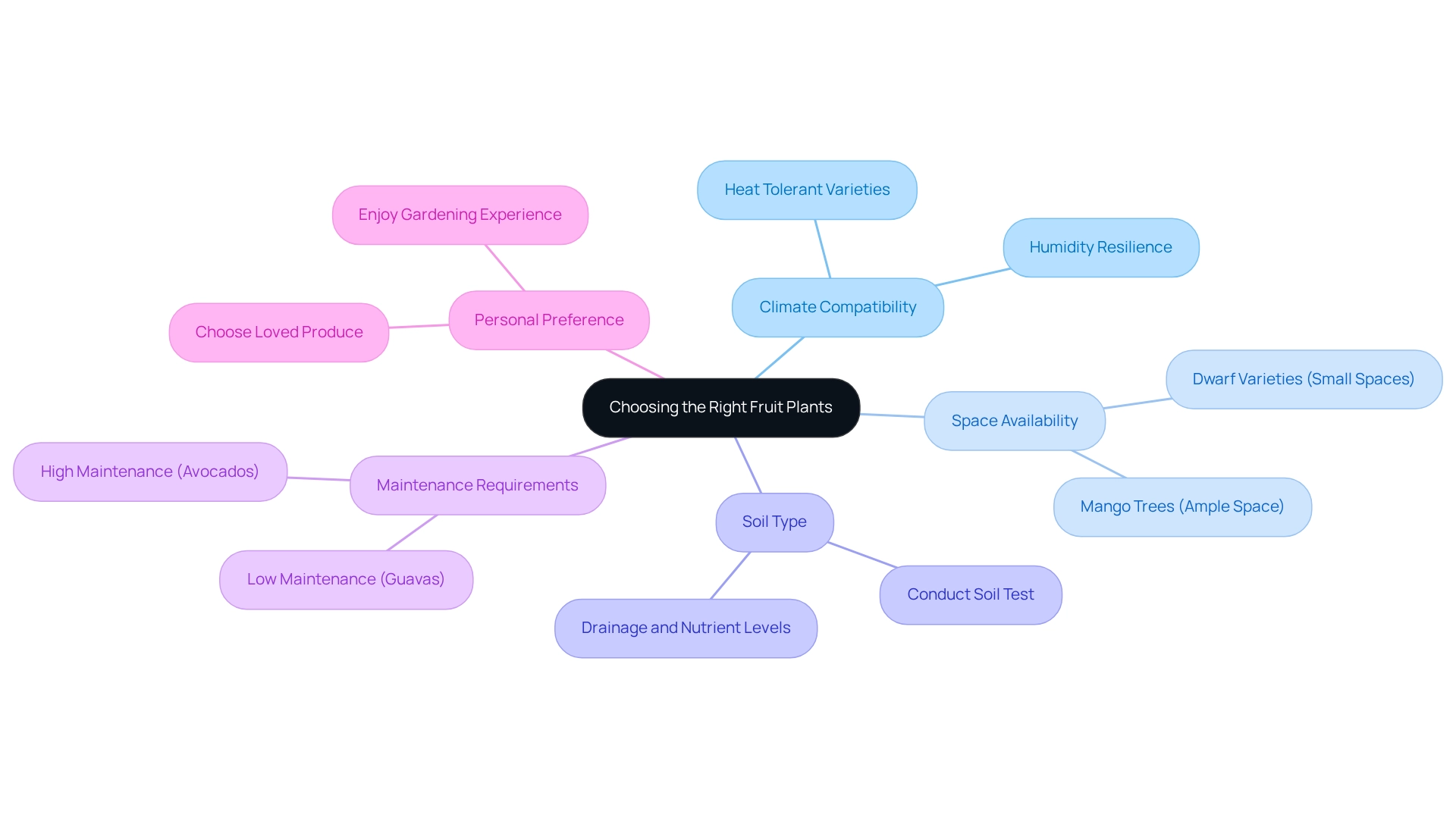
Quick Recap: Must-Have Fruit Trees
- 🥭 Alphonso Mango – juicy and aromatic
- 🥑 Hass Avocado – creamy and nutritious
- 🍈 Pink Guava – tropical and fragrant
- 🍒 Lychee – sweet and floral
- 🌳 Dwarf Fig – compact and delicious
- 🍌 Banana – tropical beauty + fruit
- 🌿 Soursop – tangy, nutrient-rich
- 🍇 Passion Fruit – antioxidant-packed vine
👉 Shop the Full Fruit Tree Collection
Frequently Asked Questions
What is Everglades Farm known for?
Everglades Farm is an online nursery located in Homestead, specializing in a variety of tropical fruit plants, with a commitment to sustainability and customer satisfaction.
What types of plants does Everglades Farm offer?
The farm offers a wide selection of healthy, high-quality tropical fruit plants, including fast-growing and dwarf varieties suitable for small spaces.
How does Everglades Farm ensure the quality of their plants during shipping?
Each plant is packaged with moisture barriers to maintain soil integrity during shipping, ensuring they arrive in optimal condition.
What kind of support does Everglades Farm provide to customers?
Everglades Farm has a robust support system that addresses common gardening challenges, including sourcing healthy plants and providing care after purchase.
What is the customer satisfaction rate for Everglades Farm?
79% of customer reviews rate their service as five stars, reflecting the farm's commitment to delivering an exceptional gardening experience.
What are the ideal growing conditions for mango plants in Florida?
Mango plants thrive in full sun and well-drained soil, requiring ample space for optimal growth.
How quickly can mango plants start producing fruit?
With diligent care, mango plants can start producing fruit within 2-3 years.
What is the potential yield of a well-cared-for mango plant?
A well-cared-for mango plant can yield up to 200 fruits per season.
What are the ideal conditions for growing avocado plants in Florida?
Avocado plants thrive in well-drained, loamy soil and need full sun to flourish.
How long does it take for avocado plants to start yielding fruit?
Avocado plants can start yielding fruit within 3-4 years.
How can cross-pollination benefit avocado plants?
Planting different varieties of avocado plants can enhance the fruit set through cross-pollination, boosting productivity.




